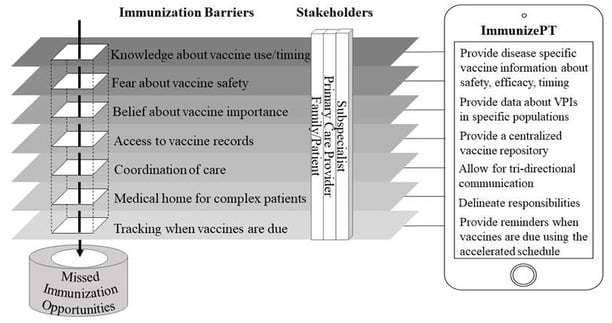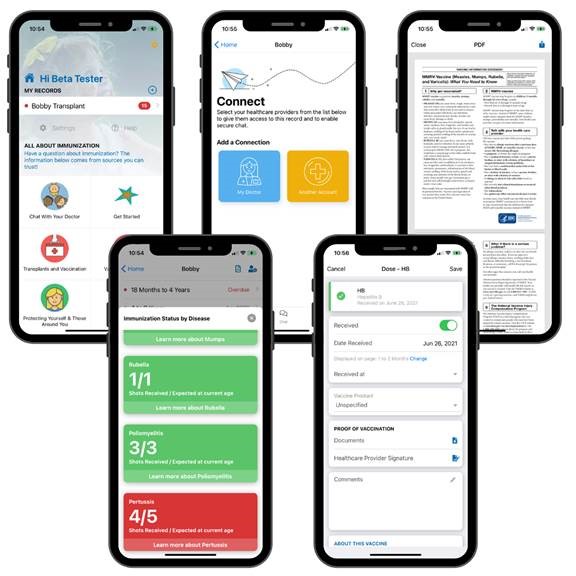While most conversations about vaccinations concern the COVID-19 vaccine, Dr. Amy Feldman is focusing on vaccinations of a different kind. The standard kind.
A staggering number of pediatric transplant patients, one in six to be specific, are hospitalized within the first five years post-transplant with a potentially vaccine-preventable illness. Understanding this phenomenon and increasing standard vaccinations among pediatric transplant patients is the focus of Dr. Feldman’s research. She is currently in the third year of a five-year K08 Career Development Award from the Agency for Healthcare Research and Quality entitled Improving Immunization Rates in Transplant Candidates Through the Use of a Health Information Technology Tool. Dr. Allison Kempe, director of ACCORDS, and Dr. Ronald Sokol, Chief of the Section of Pediatric Gastroenterology, Hepatology, and Nutrition, serve as her primary co-mentors.
For Dr. Feldman, ACCORDS researcher, Associate Professor of Pediatrics-Gastroenterology, Hepatology and Nutrition at CU Anschutz School of Medicine, and Program Director of the Liver Transplant Fellowship at Children’s Hospital Colorado, this work began in 2014 while she was researching pediatric liver disease. As a 4th-year fellow at Lurie Hospital of Chicago, Dr. Feldman observed transplant patients falling ill to vaccine-preventable infections and began to wonder if standard childhood immunizations were being overlooked in the pre-transplant period.
Defining the problem
To further explore this concern, Dr. Feldman sought formal training in health outcomes research and clinical interventions. She became an ACCORDS SCORE Fellowship in 2016 and began to lay the groundwork for her current immunization project. As a SCORE fellow, Dr. Feldman analyzed the Pediatric Health Information System (PHIS) data set, which collects inpatient data from roughly 40 freestanding children’s hospitals across the United States. She specifically examined data for solid organ pediatric transplant patients and their hospitalizations after transplant. This work led to the discovery that one in six pediatric transplant recipients are hospitalized in the first five years after transplant with a vaccine-preventable illness (such as chickenpox, mumps, influenza, or RSV). This statistic applies to the 1,750-1,900 pediatric heart, kidney, and liver transplant patients in a given year.
“That number is really an underestimate,” explains Dr. Feldman, “because lots of kids get these infections and are treated at home or in the emergency room. That data isn't captured in the PHIS data set.” These infections result in significant morbidity and mortality and can increase the cost of transplant hospitalization by over $120,000.
Digging deeper into the issue, Dr. Feldman next conducted a prospective study to assess whether pediatric liver transplant recipients across the U.S. were up to date for age-appropriate immunizations at the time of transplant. She found that less than 20% of pediatric transplant patients had received all of their standard age-appropriate vaccines and 50% were missing four or more vaccines at the time of transplant.
“We invest $1,000,000 in their transplant,” says Dr. Feldman, “but we've forgotten to give them the $5 standard preventative vaccine.”
Understanding barriers to vaccination
Why are these high-risk children not receiving standard preventative vaccines in the pre-transplant period? To answer this question, Dr. Feldman partnered with Dr. Megan Morris, ACCORDS Investigator and former Qualitative and Mixed Methods Core Lead, to interview 80 transplant stakeholders from Children's Hospital Colorado, Children's Hospital of Philadelphia, and Lurie Children’s Hospital of Chicago. This group included parents of children who had received a heart, liver, or kidney transplant; pediatricians who had taken care of a transplant recipient; transplant nurses; transplant ID doctors; and transplant sub-specialists.
“We identified four barriers to getting transplant candidates vaccinated,” says Dr. Feldman. “First, parents and team members may not know about vaccine safety, efficacy, and timing in the pre-transplant period. Second, with such a large multi-disciplinary team, vaccine follow-up can fall through the cracks. Third, there is no central vaccine registry where every member of the team can easily access the child’s vaccine records. And finally, in the pre-transplant period, many children are primarily cared for in sub-specialty clinics where preventative care such as vaccines may not be the focus.”
Dr. Feldman, with the help of Dr. Susan Moore, director of the ACCORDS Mobile Health and Informatics Core, and Dr. Sheana Bull, director of the mHealth Impact Lab, partnered with the CANImmunize Lab in Canada to build a mobile Android- and Apple-compatible health app, Immunize Pediatric Transplant, with features to address all these immunization barriers. Notable features include education about vaccines and vaccine-preventable infections; a comprehensive record of the child’s vaccinations; a chat feature allowing the triad (parents, primary care doctors, and the transplant team) to communicate even if they are not on the same electronic medical record system; and an automated system that notifies the triad when the child is overdue for a vaccine. In the coming months, the team will begin enrolling triads to trial the app in real-time while they await transplants. They hope that this app will improve immunization rates in pediatric transplant candidates which, in turn, will decrease vaccine-preventable infections and improve overall transplant survival.
In the coming months, the team will begin enrolling triads to trial the app in real-time while they await transplants. They hope that this app will improve immunization rates in pediatric transplant candidates which, in turn, will decrease vaccine-preventable infections and improve overall transplant survival.
“Through our qualitative interviews with stakeholders, we discovered that people needed an automated system that would provide information that was independent of an individual hospital system,” explains Dr. Feldman. “There's a lot of research out there suggesting that cloud-based apps allow families to really take responsibility for their child’s health and provide reminders and education, both of which are shown to improve compliance in things like immunizations.”
The company Dr. Feldman has partnered with to create the app is also interested in marketing the app as a pre- and post-transplant tool. “This is an attractive tool because obviously, you don't stop needing vaccines just because you've undergone transplant.”
Dr. Feldman cannot say enough positive things about ACCORDS and the training, mentorship, and collaborations it has provided her. “Dr. Ally Kempe and ACCORDS are 100% responsible for my development into a health outcomes researcher and my success as a junior faculty member,” she adds. “Through formal education, ongoing mentorship, and support with data analysis and grant writing, I have reached my goal of becoming an independently-funded national expert on vaccine-preventable infections in the transplant population.”
|
Click to view Dr. Feldman's bibliography.
Amy Feldman, MD, MSCS |
.png?width=792&name=boiler%20plate%20(1).png)
|

![Photo 2 2018[8]](https://news.cuanschutz.edu/hs-fs/hubfs/ACCORDS/Photo%202%202018%5B8%5D.jpg?width=279&name=Photo%202%202018%5B8%5D.jpg)


